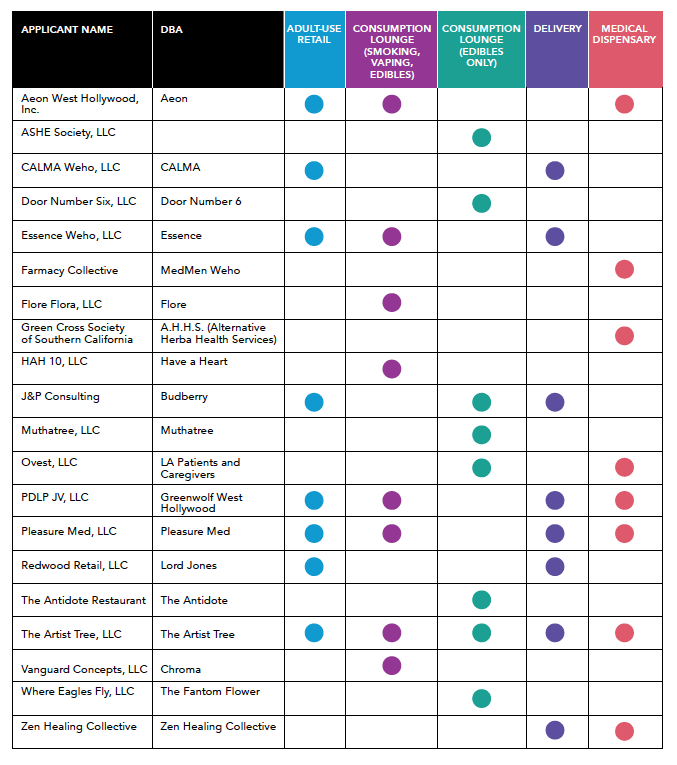[dropcap size=big]T[/dropcap]his year WeHo will become the first major city in Southern California to legalize cannabis consumption in public spaces and one of the first cities in the entire world to permit businesses combining entertainment, technology, food, and cannabis.
Get ready for boutiques like Lord Jones, "the world's first cannabis hotel and boutique" at the Standard Hotel on Sunset Blvd.; The Artist Tree, an immersive "destination for cannabis learning, consumption, and art"; as well as restaurants like Chroma, a "cutting-edge cannabis consumption program built around curated pairings, small-batch and local cannabis products, and innovative, non-alcoholic cannabis-infused beverages."
The city began taking applications for the coveted permits last April. Application fees ranged from $5,025 to $9,808. Out of 300 applications, the city announced just eight permit winners in five categories: retail, smoking lounge, edibles only lounge, delivery services, and medical dispensary.

The winners appear to lean mostly towards big business.
The Artist Tree – owned by multiple dispensary owners Avi Kahan and Mitchell Kahan – was able to secure licenses in all five categories. Pleasure Med, which secured business licenses in four categories, is owned by Brian Robinson who also owns the sex toy shop the Pleasure Chest. Green Wolf, another business that secured four business licenses is owned partly by Soheil Yamini, the proprietor of the well-known West Hollywood food delivery service Pink Dot.
More details on all the winners can be found here.

Same Old
[dropcap size=big]T[/dropcap]he cannabis industry in West Hollywood will be controlled by a handful of developers, business owners, public relations people, and politicians. While some cities in California (and cities in other states where cannabis is legal recreationally) have discussed plans to make it easier for convicted cannabis felons and POC to break into the lucrative cannabis game, West Hollywood has not.
"The city did not have specific policies that gave priority to those convicted of marijuana offenses in the past," Community and Legislative Affairs Manager John Leonard told L.A. Taco.
Each application was scored by a five-person committee based on a 200-point weighted criteria. Each member gave each applicant a score and the city averaged the totals to determine the highest scores.
Leonard pointed out the "Social Equity" section of the weighted criteria which addressed hiring, employee benefits and compensation, economic inclusion, and other business practices. Seven points out of a possible 22 were weighted to address prison reform and minority inclusion directly. By comparison, the section for applicants connection to West Hollywood accounted for 12 points. A full version of the weighted criteria can be found here.
In a statement, West Hollywood said its five committee members had "diverse and unique perspectives" in"a wide breadth" of fields including social justice, drug policy reform, and familiarity with West Hollywood.

While the cannabis landscape in West Hollywood looks diverse in some ways, it appears to exclude the victims that paved a way for its acceptance. Between 2005 and 2016 almost half-a-million Californians were arrested for marijuana. People of color were arrested at an alarmingly disproportionate rate compared to whites.
"Black, Latino, and white people consume and sell marijuana at similar rates. Yet, law enforcement officers arrest people for marijuana offenses in a racially disparate manner," according to The Drug Policy Alliance.
The Drug Policy Alliance was one of the authors of Prop 64, the bill that legalized cannabis recreationally in California. Lynne Lyman, former state director of The Drug Policy Alliance, was a member of the five-person committee.
One the best things that came out of Prop 64 was arguably the criminal justice reform that was packaged with it – marijuana convictions statewide can be overturned –something that feels like it should have been done a long time ago.
Unfortunately that doesn't guarantee those victims an ownership stake in the lucrative recreational cannabis market. Being given priority to work minimum wage or low paying jobs at the bottom of a billion-dollar business feels like too-little-too-late.
RELATED: The History of Sativa vs Indica ~ Why Everything You’ve Smoked is Technically a Hybrid







